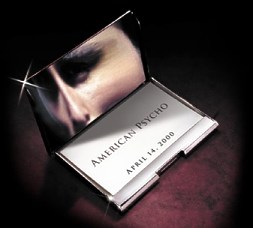|
American
Psycho
|
| |
 |
USA,
2000. Rated R. 97 minutes.
Cast: Christian Bale, Willem Dafoe,
Jared Leto, Reese Witherspoon, Samantha Mathis, Chloë Sevigny, Cara
Seymour, Matt Ross
Writers: Mary Harron and Guinevere Turner, based
on the eponymous novel by Bret Easton Ellis
Music: John Cale
Cinematographer: Andrzej Sekula
Producers: Christian Halsey Solomon, Chris Hanley,
Edward R. Pressman, Ron Rotholz
Director: Mary Harron
|
| Grade:
C- |
Review
by Jeff Vorndam |
 ret
Easton Ellis' 1991 novel American Psycho was a piece of performance art.
It aggravated this reader with page after page of tedium. A 400-page screed
of product names and graphic descriptions of brutal killings, its humor arose
from the repetition of certain phrases and incidents. For example, whenever
its protagonist, 27 year-old stockbroker Patrick Bateman, felt the slightest
bit uneasy, he was "filled with a nameless dread." The phrase became meaningless
(more so) in its overuse. That's the whole point, of course. Bateman's lifestyle,
nay, his entire existence, was meaningless drivel–a collection of accouterments
masking a sucking black hole. Because it was set in the milieu of late 1980s
Manhattan, the novel was seen as a heavy-handed satire of the excesses of the
1980s, a decade that's reflexively become synonymous with greed as if the preceding
years were times of charity and frugality. Read as a satire, American Psycho
is facile. Yuppie girlfriends, meatheads in thousand-dollar suits, hoity-toity
restaurants–they're as ripe for the picking as the fashion industry was in Prêt-à-Porter.
Why bother?
ret
Easton Ellis' 1991 novel American Psycho was a piece of performance art.
It aggravated this reader with page after page of tedium. A 400-page screed
of product names and graphic descriptions of brutal killings, its humor arose
from the repetition of certain phrases and incidents. For example, whenever
its protagonist, 27 year-old stockbroker Patrick Bateman, felt the slightest
bit uneasy, he was "filled with a nameless dread." The phrase became meaningless
(more so) in its overuse. That's the whole point, of course. Bateman's lifestyle,
nay, his entire existence, was meaningless drivel–a collection of accouterments
masking a sucking black hole. Because it was set in the milieu of late 1980s
Manhattan, the novel was seen as a heavy-handed satire of the excesses of the
1980s, a decade that's reflexively become synonymous with greed as if the preceding
years were times of charity and frugality. Read as a satire, American Psycho
is facile. Yuppie girlfriends, meatheads in thousand-dollar suits, hoity-toity
restaurants–they're as ripe for the picking as the fashion industry was in Prêt-à-Porter.
Why bother? 
It's likely then, that the satire is only the trappings of the story. The film
version of American Psycho is self-conscious enough to know that there's
a budding genre of anti-consumerist, indentity-crisis films (see The
Truman Show, Fight Club, or even American
Beauty) and it's using the conventions of black comedy to make a deadly
serious point. The problem is that the material is so over-the-top, and the
protagonist so removed from any semblance of humanity, it stretches its central
metaphor too far. The film never connects to its underlying sadness because
it's off in the vapors cavorting in a mocking tone that severs any authentic
emotional attachment to its characters. I didn't honestly believe the filmmakers
cared about Patrick Bateman, so why should I?
Bateman is played by Christian Bale, who is physically everything the novel
proclaimed Bateman to be; taut, muscular, thick-haired, and smooth-skinned.
His eyes are also unreadable, which is understandable since Bateman himself
says, "There is an idea of Patrick Bateman, but there is no me. I simply am
not there." The movie plays with this idea throughout. Bateman is constantly
confused for other co-workers, or airily dismissed as if he's not in the room.
His presence isn't that of a noun; he's more of an adverb. Maliciously. Hungrily.
Vacantly. The harder Bateman tries to be someone or something, the less anyone
notices. Bale affects his speech with an over-enunciated snobbish drawl, a parody
of the snotty rich kids in 80s teen movies. The performance is showy and superficial,
a shield to ward off anyone who tries to enter his mind. Sometimes, it pays
off with hilarious throwaway lines, like when he orders a drink while trying
to impress a co-worker ("J&B straight and a Corona!" he barks.) More
often than not, it feels like an unfunny Saturday Night Live sketch. When the
humor is in the forefront of a scene, it tries too hard. I suppose one could
argue that this is done purposely and the meaning is to show Bateman flailing
helplessly. It doesn't seem that way though. The staging of these scenes isn't
ironic (like it is in Happiness), it's
spoof-style comedy. 
The story in the film doesn't cover as much ground as the novel (thankfully),
but manages to hit most of the key points. Bateman, as he announces at the beginning
of the film, is feeling his mask of sanity slip away. He should have put out
an A.P.B. for it long ago. He spends his days making restaurant reservations
(there is one restaurant in particular that is so snooty it laughs at his request
for same-day reservations), working out, and applying a barrage of facial cleansers
to his flawless skin. There isn't a moment at work where he's actually working.
His co-workers are more of the same: nearly identical guys in power suits who
idly lament that brains and beauty never co-exist in the female form, and whose
main concern is finding a good bathroom to do coke in. The only activity that
gets a rise out of them is the comparison of each other's business cards. Chief
among these goons is Paul Allen (Jared Leto channeling Emilio Estevez at his
most vapid), the lucky son-of-a-gun who landed the mysterious "Fisher account."
For Bateman, the Fisher account is the ultimate status symbol, the one thing
he doesn't have but feels would define him if he possessed it.
AboutFilm.Com
The Big Picture
|
| Carlo |
-
|
| Alison |
-
|
| Kris |
A-
|
| Jen |
-
|
| Dana |
B
|
| Jeff |
C-
|
Astonishingly, Bateman has a girlfriend, Evelyn (Reese Witherspoon). It's astonishing
because they don't seem to have any interest in each other, even sexually. She's
a stereotyped ditzy socialite who is oblivious to Patrick's blatant mental problems
and is fixated on marriage. Unenthused by this prospect, Bateman carries out
numerous affairs with prostitutes and other women. These affairs aren't typical
vanquishments of errant male lust however, they are sacrifices at the pit of
Bateman's fiery volcano. In case you didn't know, Bateman kills people. The
crux of the film is that's not what makes him a psycho. What makes him
a psycho is his overweening need to consume and to construct a facade. Serial
murder becomes an exaggerated metaphor for vain careerism and soul doubt, and
it doesn't translate very well. Part of the reason is because Bateman is a creature
who (self-admittedly) only has feelings of greed and disgust. There's no person
to begin with, no fallen angel to redeem. Bateman was murdering people before
the film started–we never see a glimpse in the first half of the film that he's
anything but who he says he is. His facade begins to crumble when his secretary
Jean (Chloë Sevigny) shows some genuine concern for his well-being. There's
a flicker of recognition in Bateman. He knows he's doing something wrong and
that he's fighting a losing battle. By this time though, his character has become
so repugnant it's difficult to care.
The much anticipated violence and sexual content is minimal, considering the
story. Director Mary Harron wisely has Bateman conducting most of the violence
offscreen, leaving the grisly details to the viewer's imagination. Directly
showing the violence would have been too distracting, and would have further
alienated the audience from Patrick Bateman. The art direction trumps up the
banality of the era at every turn. Every fashion choice, accessory, and locale
wallows in the trivial contemporaneity of the late 1980s. It gives the feel
of a period piece from only a dozen years ago. With the humor falling flat and
the story bearing the repetitiveness of the novel, American Psycho is
a patience-trying film, even at 97 minutes. Unexpected bright spots are provided
by Leto, whose natural arrogance and insipidity contrast with Bale's forced
cartoonish approximations. This isn't a criticism. Bateman needs to be differently
fake and avaricious, just as Paul Allen must seem to be born with clueless hauteur.
Another dash of likeability in the film is Cara Seymour as Christie, a prostitute
who can't resist Bateman's money, even when she knows it means unspeakable pain
for herself.
American Psycho is interesting for what it's trying to accomplish
within the constructs of a serial killer/comedy/satire. If you can discern
some sadness or vulnerability from these scenes, then perhaps the film
will have some value for you. I would say it missed the mark, and that
Bateman, as presented, was impossible to feel anything but loathing for.
This is attributable to the mocking style of comedy that is attempted throughout
the film, but also probably to my expectations built-in from the novel.
If it's square to dislike a film because the protagonist turns you off,
then as Huey Lewis once wisely noted, I am "hip to be square."
[Postscript with Spoilers: There is a subplot in the film involving
a private investigator played by Willem Dafoe who acts as sort of an interrogating
conscience of Bateman's. Near the end of the film, it is suggested that all
of Bateman's actions may have simply taken place inside his head–that none of
the killings ever happened. Because Bateman is an unreliable narrator (a la
Fight Club's "Jack") and much of the plot is frankly unbelievable in
a realistic sense, this seems highly probable. I don't think it changes the
intent or focus of the film much, since the problem all along has been what's
inside Bateman's head and specifically what's not there.]
(Special thanks to Dana Knowles for
keeping me from dismissing the film outright. Her insights were helpful even
though we didn't share the same opinion on the film.)
Review ©
April 2000 by AboutFilm.Com and the author.
Images © 2000
Lions Gate Entertainment.



